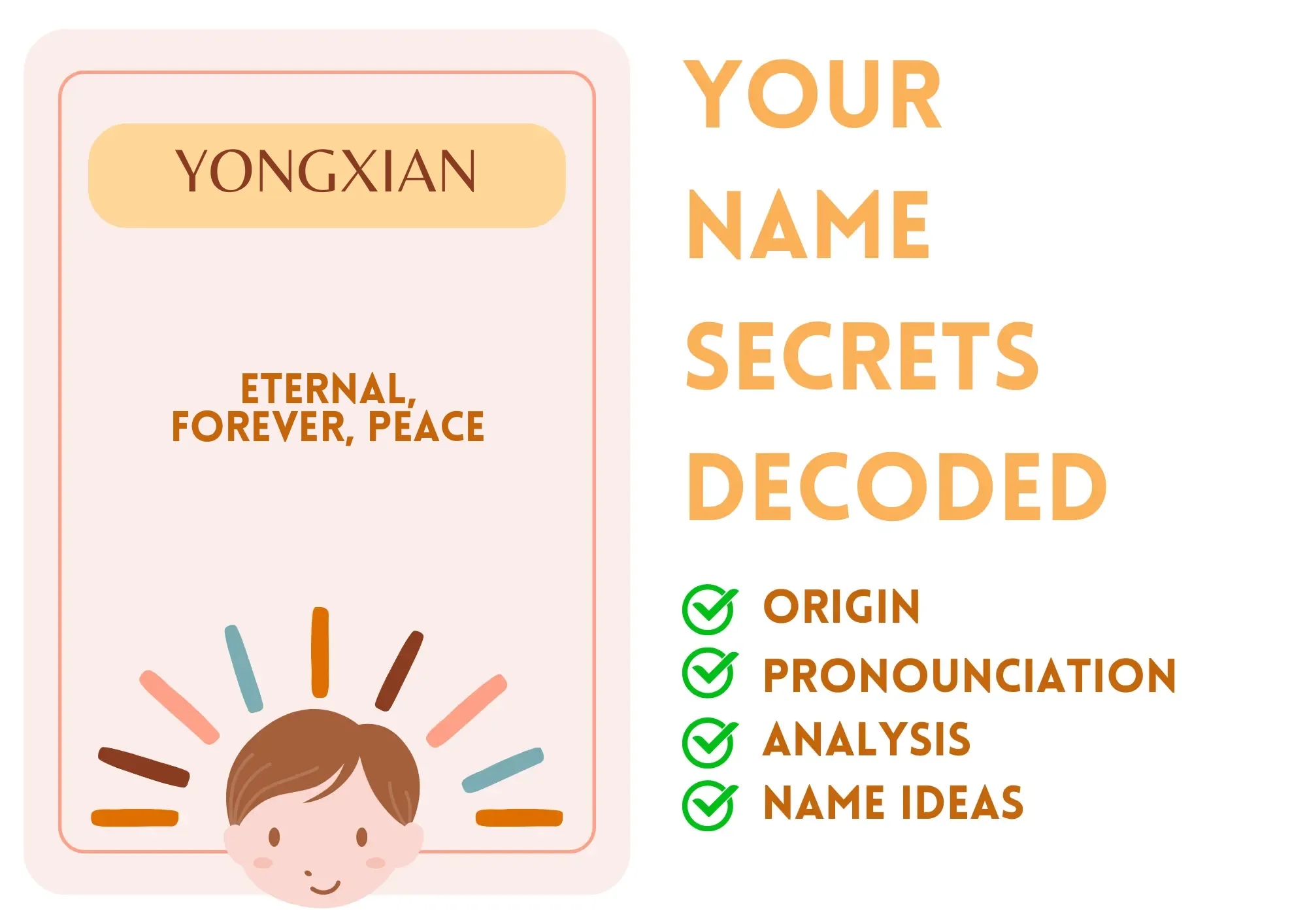
Yongxian
Yongxian is a name of Chinese origin, translating to 'eternal' or 'forever' (永 - yǒng) and 'peace' (闲 - xián). It is primarily used for boys and has rich cultural significance in Chinese-speaking communities. Often seen as a name that conveys a sense of calmness and enduring virtue, Yongxian reflects the values of peace and longevity, which are highly regarded in Chinese culture.
The name is positively perceived, evoking feelings of stability, serenity, and timelessness. It is straightforward to pronounce and write, appealing to parents who favor meaningful and culturally resonant names.
While not as commonly referenced in popular culture, Yongxian embodies traditional ideals that resonate throughout Chinese literature and philosophy, making it a distinguished choice for a child.
Basic Information
Gender: Boy
Sounds Like: YOHNG-shee-ahn
Pronunciation Explanation: The first syllable is pronounced 'YOHNG' (like 'long' but with a 'Y'), followed by 'shee' (rhymes with 'bee'), and ending with 'ahn' (short, like 'on').
Summary and Meaning
Meaning: eternal, forever, peace
Origin: Yongxian has roots in Chinese culture, based on the Mandarin language.
Usage: Yongxian is traditionally a masculine name but can be used for unisex purposes in some contexts.
Name Number (Chaldean)
Name Number (Pythagorean)
Popularity (Global Rank)
Overall: 227580
Boys: 45944
Most Popular in
Religious and Cultural Significance
Religion: Buddhism
Background: In Chinese culture, peace and longevity are important aspects of Buddhist philosophy, which often utilizes quietude as a key principle.
Cultural Significance: The values associated with Yongxian are deeply respected in various forms of Chinese art, poetry, and philosophy, where peace and eternal virtues are celebrated.
Historical Significance: Historically, names like Yongxian embody characteristics praised in ancient Chinese literature, representing ideals that have been upheld over centuries in philosophical texts and folklore.
Popular Culture
Literature and Mythology: Yongxian may not specifically reference a character in mainstream media, but it embodies qualities found in classic Chinese literature, where themes of peace and eternity are prevalent.
Movies and Television: The name isn't associated with any popular characters in film, but might appear in historical dramas or adaptations influenced by classical Chinese narratives.
Feelings and Perceptions
Perception: Yongxian is generally viewed in a positive light, recognized for its harmonious connotations and tranquil significance. It is often seen as a calming and noble name.
Positive Feelings: Serene, strong, meaningful, harmonious, timeless.
Negative Feelings: It may be unfamiliar to non-Chinese speakers, and pronunciation could be challenging for those not acquainted with Mandarin.
Practical Considerations
Ease of Writing and Calling: The name Yongxian is moderately easy to write, utilizing Chinese characters; however, it may be slightly challenging for English speakers to pronounce correctly on the first attempt.
Common Typos and Misspellings: Yongxianh,Yongshan,Yongxain,Yongshan
Common Nicknames: Yong,Xian,Yoshi
Yongxian Popularity
Yongxian Usage and Popularity By Country
| Country | Rank (Overall) |
|---|---|
| Singapore | 13150 |
| Australia | 51998 |
| Germany | 81441 |
| United Kingdom | 90588 |
| Malaysia | 93908 |
| United States | 102851 |
Yongxian Usage and Popularity By City
| City | Rank (Overall) |
|---|---|
| Peking | 6816 |
| Melbourne | 23253 |
Compatibility Analysis
Famous Persons Named Yongxian
No results found for Yongxian.
Related Names
Similar Sounding Names:
Yunxian,Yongjian,Yongrui,Yunxiang